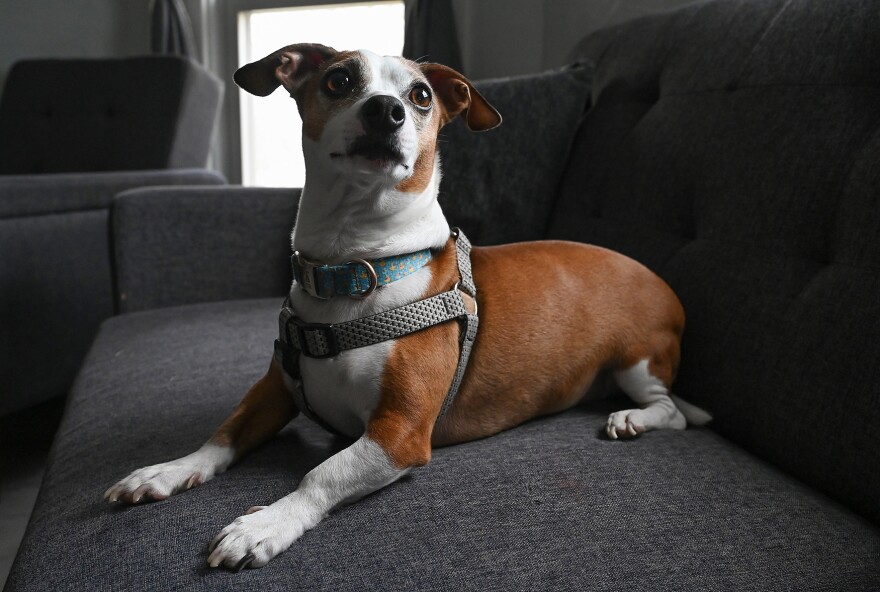Nick Nack is a transgender man and spoke about the challenges of going through a puberty that didn’t align with his gender.
Alphabet Soup shares LGBTQ+ Missourians’ stories through portraiture and personal narratives.
Nick Nack: In the sixth grade, we did a class strength competition, and I was the strongest person in our class, and I was so happy.
I started puberty earlier than a lot of other people, as well, but I was really strong. I was the tallest person in the class, and then all of my – and I would arm wrestle my guy friends. We would like to play tag. We would play hide and seek, like we do these fun things, but some of the strength-based ones, like arm wrestling, I started to lose out where I was winning before, and it got to where I was losing every against every single person, whereas before I had won almost all of my arm wrestling matches.
And so, I was watching that happen, and then they were getting taller, and then I got boobs, and I did not want boobs. That getting boobs was, like, really, really, really hard. That was, like, one of the most distressing parts of puberty for me, was getting boobs and just the period, like, who wants a period? My God.
Laughter
Horrible.
But yeah, I was so I was expecting to kind of get stronger, get taller, and that's not what I got, so puberty was really difficult for me.
I knew something was different. I was expecting a male puberty. I didn't get the male puberty, and instead, I got a bunch of other stuff that I didn't want.
My mom knew that I had a really hard time with bras – wearing training bras, wearing bras – I didn't want to wear them, and that, like every step of the way, I was just like resisting and resisting and resisting and resisting, and that I would get really upset about it.
But we didn't really have a conversation about why. It was more like, “This is what you're supposed to do, and so you need to do it and get used to it.” So, I did.

I will say, in middle school, I found some documentaries on the internet about trans women, but I just didn't make the connection that, like, you could be trans in the other direction, like, I just, like, for some reason that, like, it didn't quite click.
And so, I saw those things, and I was like, “Wow, that's interesting,” and I think my mind also just kind of blocked anything that like felt familiar, like, if it was in the direction of bad, if it felt familiar, I would just, I would just repress it. So, I didn't really think about it.
But I did have a daydream, that running daydream I had – basically like a twin named Nikolai that lived next door to me, and we would do everything together, and we were like the same person, but he was a guy, and I was a girl.
So, it was kind of my way to, like, process what I wanted without really understanding what that meant at that time.
I've thought before about how kid me would think if they saw where I was at today, and it's a hard thing for me to wrap my mind around because it's so different, and I had no idea that I was trans when I was a kid.
But I think sometimes I'll imagine that kid me starts to put the pieces together and realize it – seeing me now, and goes, “Thank God,” like, “Thank God, we figured it out” because I was so confused, and I was so frustrated and upset.
And so, I think that would be really a relief to kid me to know that things get better.






![Carol Snively, a queer woman and former President of The Center Project who came out in her 30s, stands on the building’s steps on Thursday, Dec. 19, 2024, in front of The Center Project in Columbia. “Because she was so likeable, everyone loved Ellen [DeGeneres]. She was so funny, and so I think it did help family members, although it took me a while to tell every one of my family members. I was very nervous about [coming out] for very silly reasons that didn’t end up being a need to be fearful. They’re all very accepting. It just took me a long time. But yes, having people in the public eye that were out—because after she came out lots of other people started saying what their identities were,” Snively said. “And so the fact that there were celebrities who were starting to talk about things and normalize identities, I think that really helped for me. It didn’t change who I was, but it made it easier for me to verbalize who I was.”](https://npr.brightspotcdn.com/dims4/default/2bf9526/2147483647/strip/true/crop/1728x1143+22+0/resize/130x86!/quality/90/?url=http%3A%2F%2Fnpr-brightspot.s3.amazonaws.com%2F2b%2Fbd%2F94ba4fa54eb5a2335f025df8de94%2F20241219-bas-queer-joy-carol-snively-0054.jpg)
